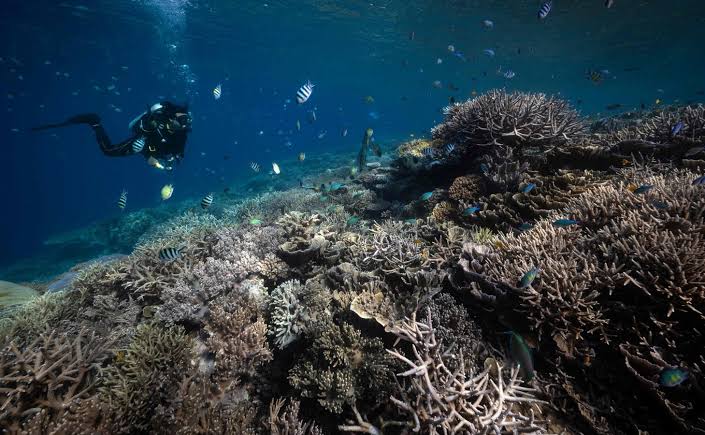Exclusive-World on brink of fourth mass coral reef bleaching event- NOAA

- 06 Mar 2024
Why is it in the News?
The world stands on the brink of witnessing its fourth mass coral bleaching event, a phenomenon that threatens to hit vast expanses of tropical reefs, including significant portions of Australia's iconic Great Barrier Reef.
Key Findings from the National Oceanic and Atmospheric Administration (NOAA):
- Impending Fourth Mass Coral Bleaching Event: The world is on the brink of a fourth mass coral bleaching event, following those in 1998, 2010, and 2014.
- To classify as global, widespread bleaching must occur across three ocean basins: the Atlantic, Pacific, and Indian.
- Impact of Previous Events: The last global mass coral bleaching event occurred from 2014 to 2017, resulting in the loss of nearly a third of the Great Barrier Reef's corals.
- Preliminary data indicates that approximately 15% of the world's reefs experienced significant coral die-offs during this event.
- Current Situation: This year is witnessing even more severe bleaching events, with the Caribbean experiencing its worst coral bleaching on record following the Northern Hemisphere summer last year.
- Link to Climate Phenomena: Coral bleaching is often associated with the naturally occurring El Niño climate phenomenon, which leads to warmer ocean waters.
- Climate Change Impact: The world recently experienced its first 12-month period with an average temperature exceeding 1.5 degrees Celsius (2.7 degrees Fahrenheit) above pre-industrial levels.
- A temperature rise of 1.5°C is considered the tipping point for mass coral die-offs, with scientists estimating that 90% of the world's corals could be lost as a result.
About the Corals and Coral Reefs:
- Corals: Corals are animals known as polyps, which engage in a symbiotic relationship with tiny algae called zooxanthellae.
- These algae provide corals with food and oxygen, while corals offer them a safe habitat.
- Coral Reefs: Coral reefs are limestone structures formed by thousands of tiny coral animals and are predominantly found in tropical climates.
Coral Bleaching and Its Concerns:
- Coral bleaching occurs when corals are exposed to stressful conditions like high temperatures, pollution, or changes in water chemistry, leading them to expel the zooxanthellae.
- Without these algae, corals lose their color and turn white, hence the term 'bleaching,' and cannot survive for long in this state.
- Recovery Potential: Despite its severity, coral bleaching doesn't necessarily mean the end of the reef; timely removal of stressors can facilitate the return of zooxanthellae and coral recovery.
- Ecological Importance: Coral reefs serve as habitats and food sources for numerous fish and marine species.
- They also offer coastal protection from erosion and storms and play a critical role in regulating the Earth's climate by absorbing and storing carbon dioxide.
- Cultural and Aesthetic Value: Beyond their ecological functions, coral reefs represent stunning biodiversity and natural beauty, making their loss a tragic prospect for future generations.
- Impacts: When coral reefs suffer, so do the ecosystems and communities reliant on them, underscoring the far-reaching consequences of coral degradation.
